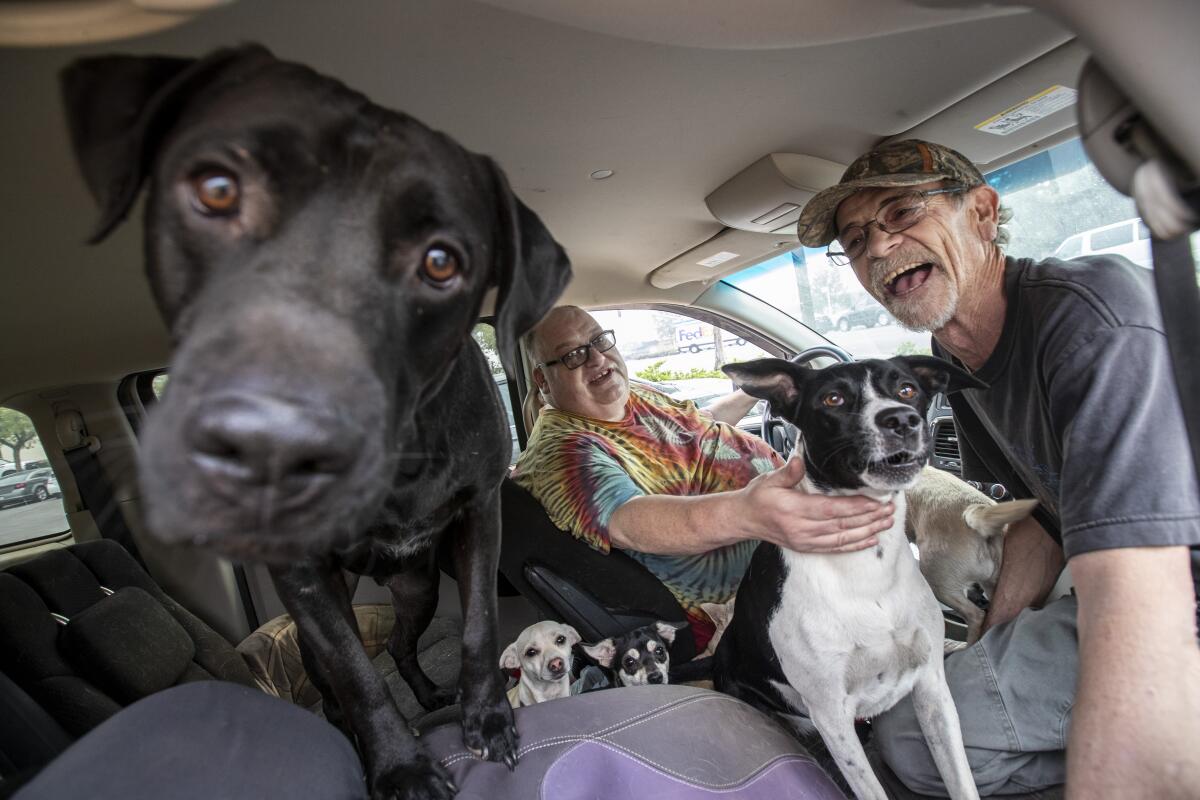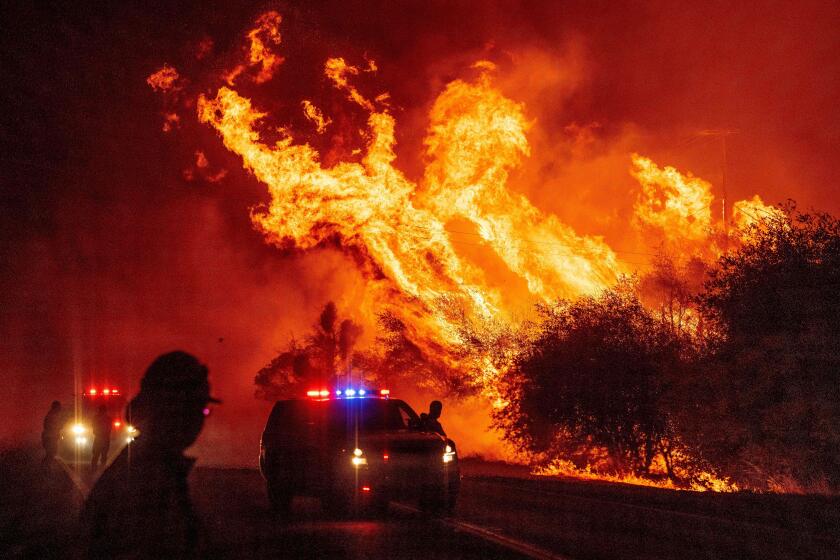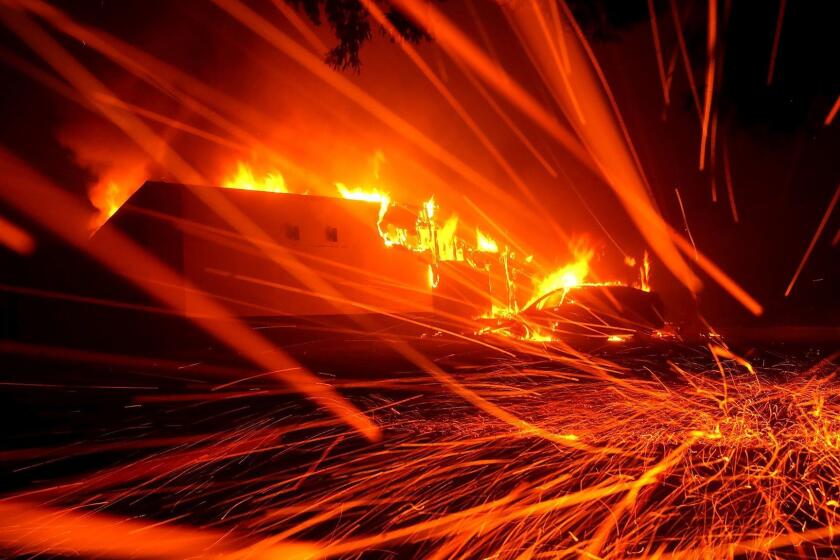‘Everything is gone’: Mass destruction in region still reeling from Paradise fire

- Share via
BERRY CREEK, Calif. — Frank Martinez considers himself a veteran of California wildfires, both as refugee and responder, feeding fire crews and survivors and running when flames hit too close to home.
“We’ve done this before,” Martinez said Thursday morning, sitting with his breathing machine inside a friend’s restaurant. After fleeing from the Bear fire in the early morning darkness Wednesday, the restaurant basement had become his temporary home.
He had no idea if his own home was still standing. It would be several hours before he had an answer.
Martinez, 55, lives in the rural hills outside of Oroville, where the Bear fire is wreaking destruction. Since 2015, flames have chased him from his double-wide trailer on four separate occasions. And that doesn’t include the time he had to evacuate when the nearby dam threatened to burst.
In all of the other blazes, when he’s been able to remain on the acre-plus of parched land he calls home, Martinez has taken in those who had to flee from the surrounding hills and ridges — about 30 people during the Camp fire in 2018 and a couple dozen during the Wall fire in 2017.
He’s also fed thousands more by raising money online — he estimates about $100,000 — and cooking up meals himself — turkey and brisket and ribs with a rub made of coriander and brown sugar.
On Tuesday, with flames bearing down on the wooded enclave of Berry Creek, a hamlet of about 1,200 people northeast of Oroville, friends once again pulled into his dirt drive looking for refuge. But this time, his hospitality was short lived. This time, he would be the one fleeing and in need of a helping hand.
By 1 a.m., Martinez and his roommate Rick Wolfe, 60, received their own order to evacuate, and the caravan of more than 20 people made its way to the flatlands of Oroville, spreading out over hotels, relatives’ homes and any available space. Despite all the planning and knowledge of previous fires, when the word came again, getting out turned chaotic.
“I was so worried about the dogs and my roommate, I left all my clothes in the dryer,” he said. “Tensions were high. Stress was high.”
Butte County has been hit with disaster after disaster. But there’s a resigned resilience among residents even as they face the North Complex fire.
Martinez and Wolfe’s first stop Wednesday was the parking lot of the Oroville Walmart, which was also a de facto evacuee center after the Camp fire, when norovirus, a disease that causes diarrhea and vomiting, hit local shelters. On Thursday, the big-box store blasted a recording asking fire victims not to stay.
Not everyone listened.
Gretchen Keary slept on the front seat of her Dodge Ram truck after running from flames in an area called Kelly Ridge Tuesday night, while her boyfriend, Will Henry, made do on the ground outside. The two had purchased sleeping bags at Walmart, along with crates for their three cats. On Thursday morning, they were packing up to go in search of breakfast and a better place to stay.
Keary had moved from the Bay Area about two years ago and “it’s been life by wildfire ever since,” she said. “The planet is pissed off.”
Nearby, Bill, who declined to give his last name, had evacuated on his Harley-Davidson from Berry Creek. He, too, had no idea if his house still stood, but he wasn’t surprised by the destruction in the tiny town he called home. Multiple residents of Berry Creek described it as densely overgrown with trees and brush. Talk of it being the next Paradise was not uncommon.
“They knew it was going to happen,” Bill said. “The woods are just so thick of dead timber, it’s four feet thick on the ground. There’s places you can’t even walk through.”
Patsy Oxford is principal of Berry Creek Elementary School. Because hers is the only school in the Pioneer Union Elementary School District, she’s also the superintendent.
Her school is gone, burned to the ground, but her students, all 60 or so of them, still need to eat. One hundred percent of the student body at Berry Creek Elementary receives lunch assistance; 91% of the students are “socioeconomically disadvantaged,” she said.
Right now, the county is figuring out how to get food to the students and their families, she said, working to establish pickup sites, trying to arrange for nonperishable supplies that can be useful for families living in hotels and other temporary housing.
“Still, it was a great school!” Oxford exclaimed. “We just got high-speed internet, we’re into the 21st century! We got it the week we went out with COVID. It allowed us to at least get kids connected.… All the kids had Chromebooks. Some lost them [in the fire]. We just gave out hotspots on Tuesday. Some kids got them, some didn’t. We’ll replace those.”
Oxford’s house in the Berry Creek neighborhood of Lake Madrone did not burn, although she has been evacuated and is staying with her daughter in nearby Chico. Eight of the 12 staff members lost their homes. The other three live in Chico and are fine.
When Oxford answered the phone, she said, “we’re just watching a video.” It was on Facebook, she said, and it showed the fire’s devastation. She paused. Choked up. Continued. “We thought, ‘Oh, maybe something survived.’
“But nothing survived. Only there’s a red door in the middle of it. I want that door,” Oxford said. “It’s like Paradise was. The fire just went through and everything is gone. One student on the street, his house, it’s still standing. Still standing is good, but it’s going to be a long haul.”
Echoes of nearby Paradise are everywhere in the Berry Creek fire, with so many reminded of the small town destroyed two years ago. The Oroville School District has reached out, and people are talking about finding space, maybe a couple of vacant classrooms, for Berry Creek Elementary to use to regroup. That space is in the same school Paradise educators used after their town was razed.
The fate of Paradise was cast long before a windstorm last month fueled the deadliest fire in California history.
Educators from Paradise and Concow — victims of the Camp fire — have offered advice and moral support. The community is hoping to get trailers from the Federal Emergency Management Agency left over from the 2018 inferno. The Gridley fairgrounds have opened up for evacuees, Oxford said, just like it did in the earlier disaster.
The same foundations that helped after the Camp fire are poised to help now: The North Valley Community Foundation, Butte County Schools Long-Term Recovery Fund, the Butte Strong Fund.
“One of the big things Paradise said was get the kids to connect,” Oxford said. “Let them see each other. With COVID, that’s hard. We’ll Zoom in a week or so. We’re hoping to connect with the Paradise kids, maybe with a video, ‘Things Get Better.’
“It’s pretty darn devastating, pretty horrible,” she said. “Unfortunately, everyone in Butte County has been down this road before.”
The difference, this time, is the educational effort forced on the world by the novel coronavirus, the circumstance everyone loves to hate.
“We’re doing distance learning,” Oxford said. “That’s, in a bizarre way, a good thing.…
“The upside of COVID-19. Who knew? Who knew there was an upside?”
On Thursday afternoon, smoke as thick as coastal fog hovered over the water of Lake Oroville and fire continued to burn around Berry Creek, although the main blaze had moved on. Red licks of flame sprouted from power poles and crackled in curving lines across scrub grass.
Hundreds of workers, from power linemen to animal rescuers, trudged up the closed road to begin the work of recovery, which will take years. A stallion and a mare were loaded into a trailer, firefighters with water trucks sprayed troublesome spots, and a few die-hards who refused the evacuation order waited in cars on or lawn chairs for the chance to return to what was left.
By Thursday afternoon, Martinez and a reporter made it to his house, which was still standing.
“My God, my God, my God,” he said, as the low brown trailer came into site, unharmed. An RV and a pontoon boat were nearby. Fire had not made it here, though burned trees from the 2017 Wall fire, which came within two feet of his propane tank, still remained.
At 1:19, he texted his friend Lilli Heart, who lives in the town of Cottonwood, not far from Redding. When Heart lost her Paradise home in the Camp fire, Martinez reached out on Facebook nine days later. “I have resources, sweetheart,” he said by Facebook Messenger. “What do you need right now? What do you need today?”
The two have never actually met, but Heart sent money to Martinez’s PayPal account to help him in this terrible time. She didn’t think twice, after all he’d done for so many people. She wasn’t the only one to help the man who had helped so many.
“Our house is still there,” Martinez texted to Heart. “Oh my God. This is the second fire we were told our house is gone. We are not out of danger. But it’s still there..... I want to send you the money back.... I want to send everybody’s funds back.”
And later: “I feel so bad. Oh my God, I can’t believe this happened. Berry Creek is gone. All 12 people who are missing are our friends, and two have perished.”
Heart had a simple response. It was one she’d learned from hard experience.
“It’s not the time to feel bad if your home is still there,” she texted back on Thursday afternoon. “It is time to celebrate your good fortune.”
More to Read
Sign up for Essential California
The most important California stories and recommendations in your inbox every morning.
You may occasionally receive promotional content from the Los Angeles Times.















